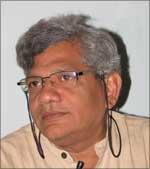Charging that India was following a neoliberal agenda, Communist party of India (Marxist) leader Sitaram Yechury on Friday said the economic policies in the country have created deep class divisions and could seriously threaten its existence.
 "You have a shining India for a few and you have a suffering India for the vast majority," the Marxist leader said in an address at the prestigious Columbia University.
"You have a shining India for a few and you have a suffering India for the vast majority," the Marxist leader said in an address at the prestigious Columbia University.
He said the economic policies had led to the creation of two classes in India -- one comprising the 77 per cent of the country which lived on less than Rs 20 and the second where the number of millionaires had doubled.
"How the process of capital accumulation that is done through expropriation rather that appropriation... that is leading through a great deal of distress and destruction of peasantry and petty production," he added, pointing out 200,000 farmers had committed suicide in recent years.
Speaking on Neo-Liberalism, Secularism, and the Future of the Left in India, Yechury stressed that the "two Indias" could not survive together.
"These are the two Indias that are now in making. And these two Indias cannot co-exist for long and unless this trajectory is changed the very concept of modern India will be very seriously threatened," he said.
Admitting that the recent elections had been a downer for the Communist Party in India, Yechury however said the present lull was only temporary because the future of the nation and the Left were inextricably intertwined.
"The future of India depends on the future of the left and hence the future of the Left and the future of India are inseparable," he said.
"Left's opposition of neo liberalism and the Left's upholding of secularism that continues to allow this idea of India to be further realised," he said.
Yechury also spoke against efforts to impose uniformity on the country, and said the nation could be kept united only if there was a push to strengthen the commonality within the diversity.
"Any effort to impose any uniformity and particularly religious uniformity would lead to an implosion of the society and that would render the idea of India completely unrealisable," he said.
"The imperative to uphold secularism in India is to uphold democracy".
Pointing out that towering Dalit leaders like B R Ambedkar had been unable to rid the nation of caste barriers, Yechury said: "It is not only a change in heart of how you deal with these castes... oppression can be ended through economic empowerment".









 © 2025
© 2025